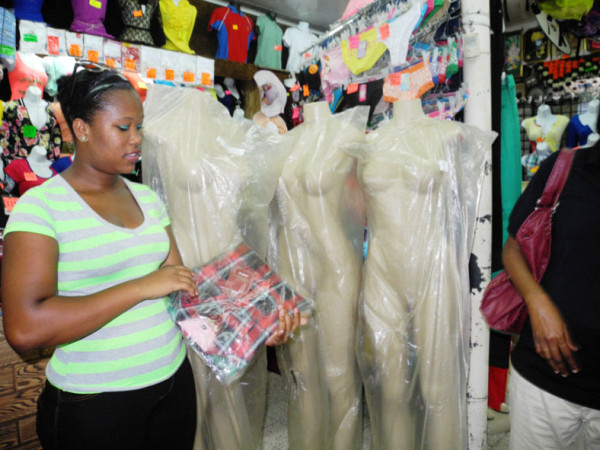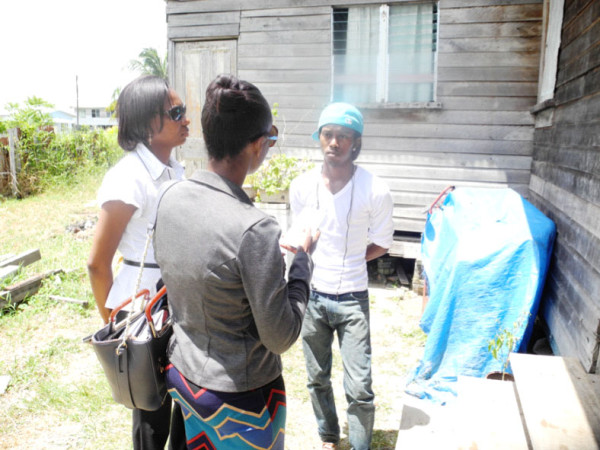Kishaunna King was a high-school dropout with no sense of direction. But a chance meeting with a coach from the USAID’s Skills and Knowledge for Youth Employ-ment (SKYE) Project saw her being able to turn her life around.
Now the proud owner of a boutique with an eager desire to return to her studies, King, 18, lays it bare telling the Sunday Stabroek that prior to being part of the project she was “just home” with no skill and not in pursuit of any.
“I am a changed person. I changed my attitude, because before I was a rude girl. I changed my behaviour and I can speak better. I know more about Maths and English,” the teenager told this newspaper from her Crane, West Coast Demerara home.

But the real icing on the cake for her is the opening of her boutique, Kish’s Passion, which has empowered her. She hopes that come next year she would start taking classes that would lead to her writing the Caribbean Secondary Education Certificate (CSEC) examinations.
Looking back on her life, King said that if she knew then what she knows now she would not have opted to leave school when she was told she had to repeat Form Three because of her low grades. “I would repeat because I know at the end I would write CXC,” she said reflectively.
King is the last of six children and her dream is to become an established businesswoman. Should she continue in the same direction she is well on her way to realising it.
It is youths like King that the SKYE project is geared towards, according to its Chief of Party Magda Wills who said that the genesis of the project was to give at-risk youths a second chance in life. Since its inception some 2,200 youth have benefited from the project with 785 of them becoming employable and another 20 starting up their own businesses. The business aspect is the project’s latest component and King and the others would have started their businesses in July.
Wills said they have found that the youth they work with have talent and they don’t all want to work for an employer and it was for this reason the last component was designed. She said initially the component had failed since monies were spent but not one of the young people set up a business.
But about a year ago Karen Raphael was hired as the Youth Self Employment Manager and she along with the Educational Development Centre (EDC) home office put together a curriculum that has now seen 20 youth embarking on business ventures in the past few months.
Raphael said the youth have started businesses in poultry rearing, boutiques, web development, electrical installation, hydroponic farming and one has started a day care centre. Prior to setting up their businesses, they are involved in a ten-day training programme which is both practical and theoretical. During those ten days they are placed into groups and together they have to come up with a business idea and execute same with a startup loan from the project. Whatever profit they make from that business idea is divided among the group members after repaying the $5,000 startup loan. During the training, they develop a business plan and after graduation, Raphael said, the youth present the business plan to a panel. Prior to this, they would also have also gone through the work-ready training.
“We don’t just stop there we go out further to test their locations. We want to see exactly where they are going to set up the business… If it is going to attract customer flow and once we are satisfied with that then we go further,” Raphael said.
The further she is speaking about is assisting the youth with business kits in the form of a grant worth $200,000 maximum in supplies and equipment directly related to the business. Raphael said the youths would bring in quotations for the items and they must demonstrate that they can also supply some of what is needed. Personnel from the project accompany them to purchase the items. After this process the youth will be assigned mentors with business experience from the area and their coaches would also continue to assist them.
“So far, the reports have been pretty good. They are happy. They are seeing profits coming and at least they have their business,” Raphael said revealing that there is one 16-year-old who has started a poultry business.
In the next batch there are also two 16-year-olds who are hoping to start grocery and barber shop businesses. Raphael said most of the young people have some concept of business and they come with solid ideas. Once they have started their businesses, they must also provide accounts of their sales and profits and the project has given them simple ledgers to assist them in this area. Most of the businesses are outside the city and it is hoped that these businesses will also create employment for other young people.

Another youth to benefit from this component is Sophia resident Stevin Marks who is the only beneficiary into technology. While it is small, Marks, who works from home, said he is already seeing a profit in building websites and hosting others for businesses in Guyana and overseas. Hoping to expand his business come next year when he moves to another location, Marks said he initially wanted to be a volunteer in the project but was advised to be a beneficiary and he has not regretted it. He hopes to one day to secure a scholarship to study computer science as that is his passion. The 22-year-old said he has been technologically inclined since he was a child because of his father’s profession and he knew that one day this was the direction his life would have taken. He said the start-up assistance from the project has helped him tremendously.
The project works with youth between the ages of 15 to 24 in Regions 3, 4, 5, 6 and 10 as well as in the New Opportunity Corps (NOC). It has four components: ‘detention prevention,’ which creates and implements a system of alternative sentencing and diversion for minor offenders; ‘welcome home,’ which focuses on reintegration and ensures that youth exiting the NOC receive support to re-enter society and enter the workforce; ‘work-ready,’ through which vulnerable youth are provided with skills, guidance and opportunities to enter the workforce; and lastly ‘be your own boss,’ which provides young people with education, information and support to develop their own businesses.
Willis recalled that in 2011, the EDC, a non-governmental organisation (NGO) out of Boston, Massachusetts, USA, was contracted by USAID to do an assessment in Guyana in an effort to understand the nature of youth in Guyana. It was found that youth were entering the justice system for petty offences and there was little or no alternative sentencing options.
“We also found from employers that oftentimes youths were employed but they did not have the right attitude to work…,” she said adding that it was also discovered that there were not many training options available to youths. EDC wrote a project that would meet the needs of that population.
The project was designed to work with youth to ensure that they are given an alternative to sentencing and the detention prevention component sees the project liaising with the Probation Department of the Ministry of Social Protection and the magistracy. To address the issue of youth having the right attitude to work, Wills said, the project designed a curriculum, which had the input from groupings in Guyana, and focused on inter-personal communication, work habits and introduction to entrepreneurship.
‘Work ready’
The project’s Workforce Development & Private Sector Specialist Rawle Dundas is tasked with liaising with the private/public sectors to ensure that persons understand what the young people are being trained in.
“We don’t claim that they are the best but they have a greater appreciation for the work environment,” Wills said.
She said that after three months on the job an employer satisfaction survey is conducted to determine whether the youth will be permanent on the job. The project has a heavy monitoring component to ensure that they are aware of what is happening with the youth who have passed through the project.
The young people involved in the project are all at-risk and not just those who would have been in the justice system or the NOC but those like King who would have dropped out of school or others with low CSEC grades or from low socio economic backgrounds.
“The youths whose positions do not permit them to get out there and fight are the ones we work with,” Wills told this newspaper.
According to Dundas, after the three-month survey’s over, 90% of the employers opt to keep the youth employed. He said some companies have been taking on the project’s youth and placing them in their apprenticeship programmes and some have been relaxing the CXC requirement because of the fact that the young people are going with the right attitudes. Some companies approach SKYE, but Dundas said they would go out and look for openings. They have had youth employed from the labourer level up to lawyers’ assistants.
Dundas is also working with the Board of Industrial Training, which has been taking some of the young people into its training programmes, to help them get back into the education system. The project’s coaches also work with the Technical and Vocational Education and Training (TVET) institutions to assist youth who are interested in furthering their education.
The beneficiaries are recruited through a coaching process which sees specific persons with the requisite qualifications working in communities to seek out at-risk youth. Coaches are also stationed at the NOC. The project also has a psychologist on board, who works with youth in need of such assistance.
Wills said the young people receive tremendous support.
Also on board with the project is former director of prisons Dale Erskine, who is the project’s Juvenile Justice Specialist. Soon to be implemented in the project is the volunteering aspect where persons would ‘adopt’ one to two youth in their communities and be the go-to person who guides them and reports on them monthly.





